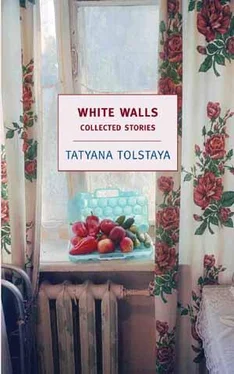The sky was silent, the earth died. Slushy rains fell for centuries. Natasha dragged the swelling caldron of her body, lumbering along on her pawish feet—there are five of them, seven of them, they’re in the way; in the mirror, heavy, clumsy eyes looked out at her from a thick, rubbery face. People walked around up to the waist in filth, they concealed stench and open sores under their clothes, and all of them thought only of one thing. And with a shudder, suspecting her own unclean, female, animal nature, Natasha felt attacked night and day by a foul wind blowing and blowing from below at her gut, at her unprotected depths.
She began to dream of silent ravines, closed underground dens, staircases with collapsing steps. Every night, ripping her nails, Natasha tore off the cold, padded doors, and behind one of those doors her dead father, his huge mouth yawning, blew a monstrous black bubble from ash-colored lips—a hellish balloon.
And Natasha lay for hours, covering herself with a blanket from head to toe so that neither humans nor the stars could discern the marshy rubbish heap writhing like putrid mushrooms in her soul, so they wouldn’t recognize the unmentionable.
At this time Konovalov began to drop in.
He came in from the cold, took out a handkerchief, and carefully dried his nose as it defrosted in the warmth; he gazed intently with his blue eyes, wiped his hands, made friends with Grandmother’s cheesecake: Natasha attracted him. Konovalov helped Grandmother with money, gave advice about Natasha’s future, moved the furniture, screwed in pale light bulbs high up on the ceiling, and, flustered, even offered a princely gift: he rented them a cheap dacha for the summer. And Natasha waited for the squeak of the door from the communal hall, the shudder of the dusty ball fringe on the door curtains, waited for the moment when, bearing a questioning blue fire in his eyes, Konovalov would enter.
But Konovalov was clean and Natasha was dirty, and she battened down all the hatches, caulked all the cracks, stood like a mute black tower. Konovalov’s blue flares fizzled out against her cold surface.
Like a frenzied falcon, Konovalov looked this way and that, circled, clicked his beak, and then, unwillingly, shot up into the air and hid himself far beyond the deep blue forest. No one ever loved her again.
…But that summer, that summer in the country, the magical farewell feather that Konovalov let fall.
In a tight sundress, with a waffle towel slung over her neck, Natasha went out on the June porch. An early sun—timid, cold, pure—trembled on high, entangled in the pine. The air was colored in unsteady morning tones—not quite color, but the intimation of color: a sigh of pink, a hint at transparency. The earth was black, firm, the grass wet, thick, and under every bush lay a hard block of lilac shade. It was damp, lush, shadowy, the garden was neglected. And the sun climbed upward and pierced the pine summits with pale rainbow knitting needles. There, at the very top, dark blue birds flitted about, and the tiny, green, sharp-tipped umbrellas shone with an unbearable, sun-filled happiness. There the morning was being made, a holiday was being celebrated, there was joy, joy, joy—a young June bride.
Beneath one’s feet was a green, prickly country, dove-gray blueberry undergrowth, the green-pea shapes of unripened wild strawberries, whitish pink fields of cockles, and beyond the bright forest—the smooth quiet of a lake burning under the sun.
And Natasha carried in her soul a limpid golden glass of champagne happiness.
By autumn she was despondent, her heart pounded, she heard voices, had dreams. From rows of late gypsy poppies, spun from gentle soporific substances, the wind blew potions, visions of bedchambers, connecting suites, cool boudoirs, light blue lacy bridges over misty waterways, muddled paths that led to a nocturnal country: a pliant, soft, brown, elusive country; to a sleepy forest with neat yellow paths, literate bears that walked on their hind legs, friendly old women who willingly lived alone in thickets and waved plump hands from gingerbread windows; and you walk farther and farther on, you’ve already made it past the round table buried in the ground, and the old gray hammock stretched between resinous spruces, you’ve passed the abandoned, child-size watering can; and you see yourself, sitting on your haunches, with a yellow silk ribbon in your hair; and on the bench, ornamented by bark beetles, your dead parents are sitting and waiting. Now you remember their faces. Mama wears white tennis shoes and a white beret; Papa sports a mustache. He’s drawing a word of some sort on the sand with a black umbrella. A strange word, you can’t quite make it out. You’re on the verge of getting it… but no. They’re looking straight at Natasha, they’re silent, smiling: What’s the problem? Well? Didn’t you understand? Just a minute, wait, any second now… there… but the thick cloth curtains of dream quiver, the faces blur, the forest grows thin as gauze, and like a fish jerked out of the water, panting and weighty, Natasha is once again here. Upon awakening the unambiguous temples of her today throb. The obscure water closes up, the lid slams shut, on the white ceiling the undeciphered abracadabra—the futile missive from her dead father—melts swiftly.
Grandmother took Natasha to the doctor, Natasha swallowed white tablets, and she no longer dreamt of anything except sighing, black waves of air.
After graduating from the institute, Natasha taught geography to schoolchildren. The word “geography” caused vast expanses to unfold in her mind: a hawk glided above the poppy fields, the muffled, nighttime sea roared, poisonous lily-white flowers swayed high overhead, and at the very bottom of the heavy, round earth, where the blue string bag of the meridians tightens into a stiff knot, a frost-covered skier, following the trail of whining dogs, slowly wandered upside down among the delicate ice glades of Queen Maud Land. But she didn’t know how to talk about this, and for that matter, no one asked her to; in fact, there was no science on earth devoted to studying the fragrance of a garden at night, the moan of sea foam, the dark splendor of the ocean’s pearls, and the dull thud of a lonely heart. What if the children were to guess—how shameful— that Natasha, their melancholy, large-nosed teacher, imagined “bauxite deposits” as forest caves from which fat, reddish, short-haired dogs in round boxing gloves tumbled one after another, and “Tung Sten” as a raven-haired Chinese prince in a robe of iridescent cast? So, afraid of being found out, Natasha spoke in a dull, confusing manner, gazed imploringly at the awkward, chapped-knuckled eighth graders, whom she feared, hinted at the answers herself, and drew pretty blue A’s on their papers with a sense of relief.
Time was passing, her heart beat, and no one arrived to love Natasha. But there were omens, premonitions, and visions, those ambiguous signs that fate proffers every so often—hadn’t the Yellow Moon, emerging with a knife from the blue billows of misty clouds, promised her something ominous, enormous, and petrifying? But now the Yellow Moon was silent and only played with the carved black shadows on Grandmother’s grave.
A long communal corridor ran through Natasha’s dwelling; overhead in the half-dark swam washbasin tambourines, dusty Aeolian bicycle harps, and over the exit, rising like a plague cemetery up in arms, the black skulls of electric meters huddled together; as night fell the white stripes of their teeth, each row marked by a single bloody tooth, began madly spinning to the right. In the evening, soccer games whistled and blazed blue behind other people’s doors, other people’s husbands argued loudly; grandmothers sitting on high beds scratched their legs. A cheerful plumber reached for his rosy young neighbor in the kitchen; the neighbor woman flapped her elbows and the cheerful plumber exclaimed delightedly: “Goooood and spunky!”
Читать дальше












